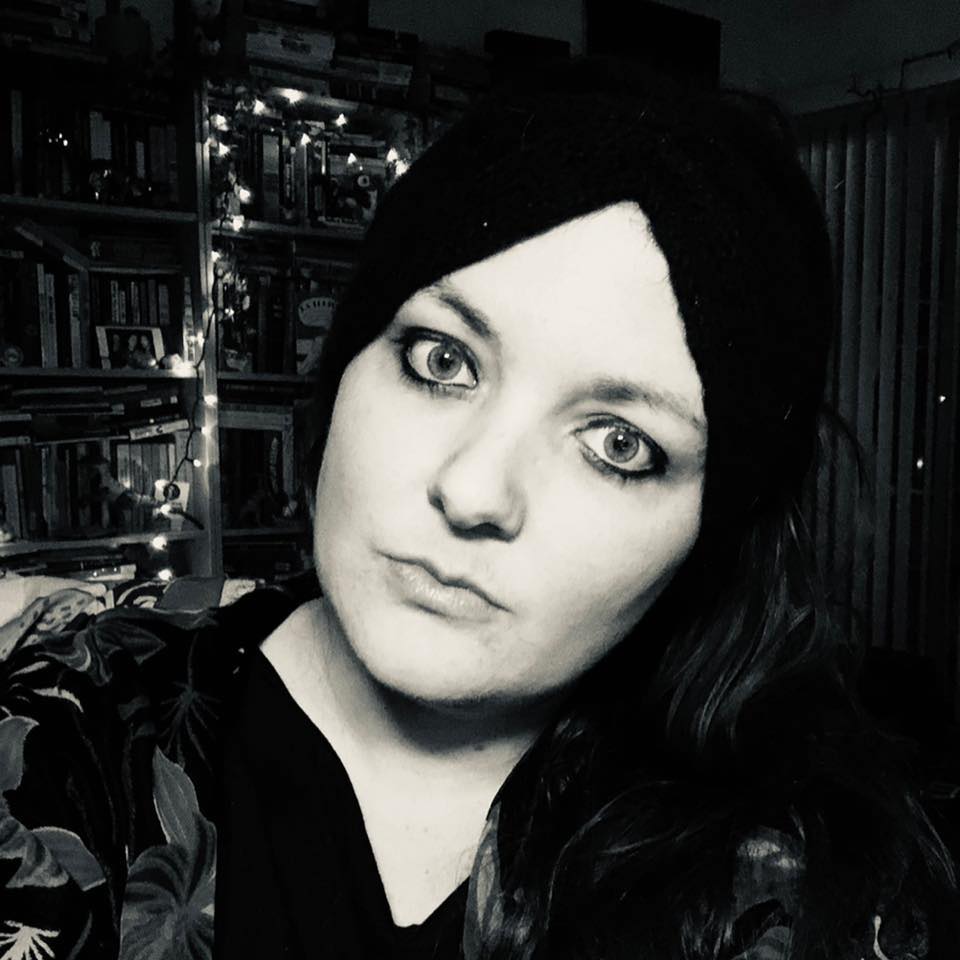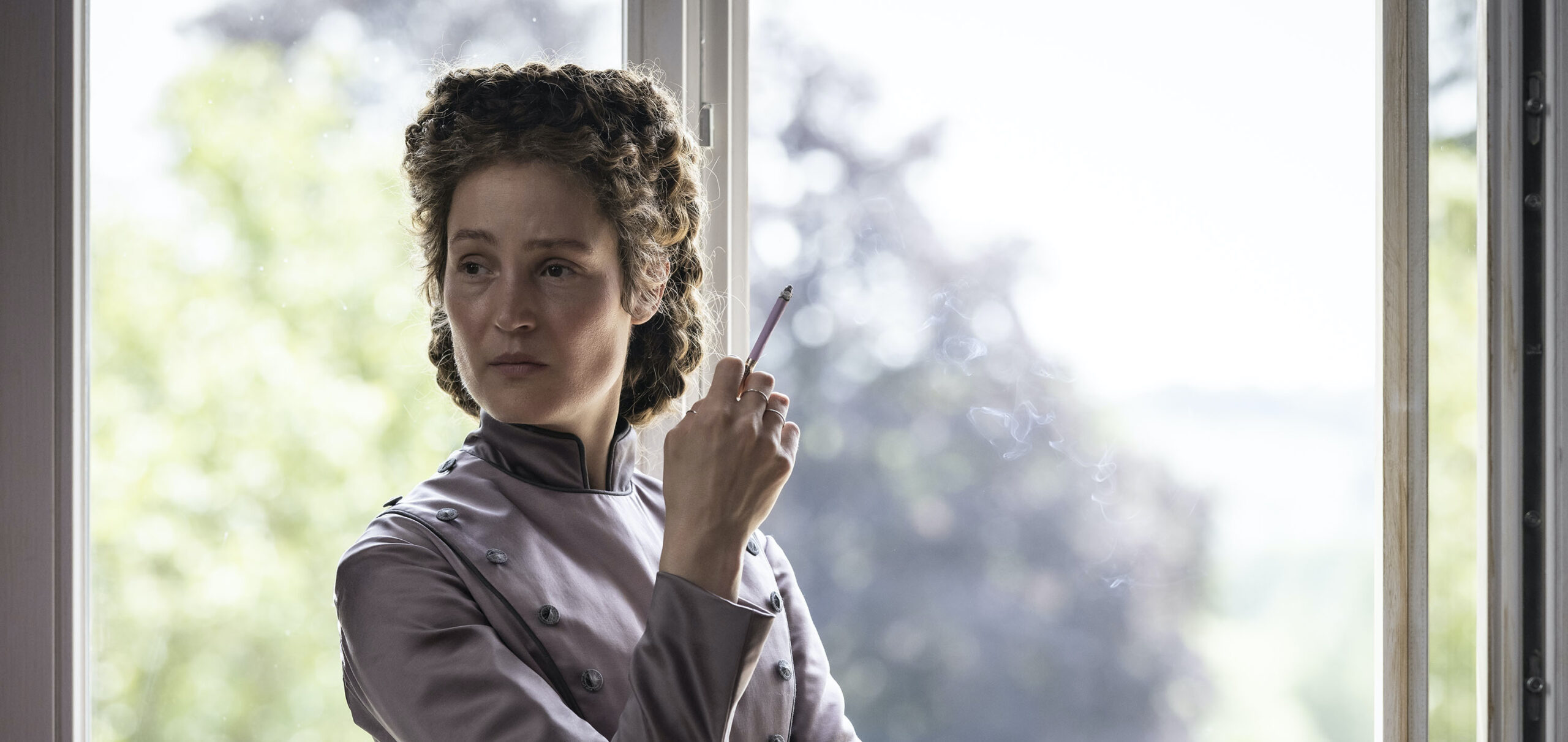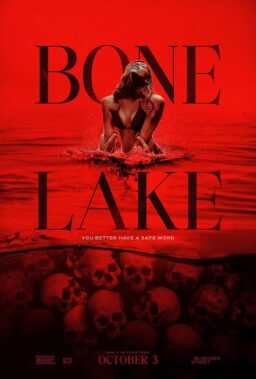19th-century Austrian monarch Empress Elisabeth of Austria was so well-liked in her time that she’s been portrayed in comics, theater, film, and television dozens of times over the last century since her death. The most internationally successful was Ernst Marischka’s 1950s trilogy of romantic films starring a teenage Romy Schneider. With a figure as frequently depicted as Sissi, it’s easy to think there’s nothing left to say about her. Yet with their film “Corsage,” star Vicky Krieps and writer/director Marie Kreutzer have found a fresh, modern approach to capturing the rebellious side of her spirit.
Kreutzer studied film at the Vienna Film Academy and has since directed short, television, and a handful of feature films, including festival favorites “The Fatherless,” “We Used to Be Cool,” and “The Ground Beneath My Feet.” Her films often explore the inner lives of women in flux, coaxing complex performances from her leading ladies.
“Corsage,” her fifth feature film, is Kreutzer’s most accomplished yet. A lush period with striking visuals sprinkled with winking anachronisms, star Vicky Krieps commands the screen, appearing in almost every scene. Her authentic period clothing—and Sissi’s famous neverending mounds of hair—added extra challenges for both actor and filmmaker alike. Yet the two worked to bring their vision to the screening and added new layers that provoke audiences to reconsider what they think they know about Sissi.
A few months ago during the New York Film Festival, RogerEbert.com spoke to Kreutzer over Zoom about collaborating with Vicky Krieps, her extensive research process, and staying true to the spirit of Sissi while subverting the postcard expectations people may have about the beloved monarch.

I’ve read several interviews you did coming out of Cannes about how Vicky Krieps had reached out to you early on to talk about making a film about Sissi. I would love to hear about your development process once you decided she was an interesting person who you had a take on.
I started researching without knowing if she was interesting. I felt like I should read something about her and go to the museums, which are all very close to my home because I live right in the middle of Vienna, just to get to know her better. Because I knew her only as a cliche for tourists and this souvenir shop image. I wanted to see if there was something in the material that would interest me enough to tell a story about her. So I was reading and meeting historians and going to museums.
Then I saw it was a little bit the other way around. I found something. I sensed her rebellion. There were many small and bigger acts of rebellion. Like when in her late 30s, early 40s she was starting to travel so much. Her interest in sports became more and more intense and crazy for that time. She was smoking, which she wasn’t supposed to do. She was not eating. So I sensed that on many levels, she was really trying to push it very far, and provoke and do something rebellious because she hated this position. That was something I could relate to.
Also, I thought it would be interesting today for everyone now because I think that we as women are still brought up and trained by society to please and we think our worth is measured by how we look and how we behave, and how good we are and how nice we are. I thought this is something that I can relate to, and that I think many, many people, and especially women, will be able to relate to. So it’s something more than just a biopic or period drama.
There’s a line maybe halfway through the film I love when she’s being photographed and she talks about not liking being photographed because they claim to be objective, but nothing is objective. That made me think about how in the last several years, there have been some iconic women who’ve had these biopics, for lack of a better word, that aren’t necessarily straight biopics; they’re really playing with the myth of them. Like “Spencer” or “Jackie.” This one, in particular, really plays with her mythology. Do you have any thoughts on this concept of women who we have an idea of who they are, but now we’re able to sort of play with that a bit with research or just with our creativity?
I think these are all characters that have something in common. The image of the beautiful, sad woman who suffered from whatever, but mostly the man on her side, and then is not really able to move because there’s this position she’s in, which demands this and that. So she’s not free to make her own choices. I think because they are beautiful, and because they’re all sad, and because you cannot look behind the doors and you don’t know what’s really going on, you just protect so much onto them. I think that’s why these characters are always good for stories because we always want to hear about them again and again and again.
And yeah, of course, when you then go into that and make a film about a character like that, you can fill in the blank however you like. You can just make it your story. When I read the biographies, they were all different in a way. The way she was described has so much to do with the time that book was written in and the person who wrote it. Was it a man? Was it a woman? Was it in the 1950s? Was it now? It depends so much on that. It was also never objective. You think it’s a biography, and a historian wrote it, so it must be objective, but it never is. That freed me. I felt like I could do my own thing entirely because I will never do it right.
It’s not possible to make the perfect film about someone who actually lived. There will always be people who will say no, that’s not correct. So that’s important. I let that go right away. I always say I think I tried to stay true to what I read about her character or what I sensed when I read about her. Not true to the facts.
Sometimes I get the question, was your film trying to be the opposite of the old films? Were you trying to make it extra different? Or what were you trying to provoke? This was never my intention. What I read about this woman, I tried to show within my own storyline, but I tried to stay true to the character that I think she had, who she was.
You mentioned her pushing herself physically with her sports and with her training. How did you work with Vicky Krieps to prep for those scenes?
She also did a handstand, but it’s not in the film.

Oh, wow.
She had to do a lot of preparation. But she’s a very physical person; she’s already really sporty. So it was not as hard for her as it would have been for me, for example. She was already a good rider, but she had to learn how to ride a lady’s seat with the corset. So there’s a lot of things to consider when you do that. She had to learn how to fence and do all of these movements in a corset, which is also like its own training. She came to Vienna about two months before the shooting started, and she really had a schedule in different colors, like going to school. Every day she had these different lessons. She learned Hungarian; she trained to do ice swimming, which is also not in the film anymore. She had to do many of these lessons every day, which I think was hard for her but that she also enjoyed very much. Especially the physical stuff. She’s really not scared of anything physical.
I love the title “Corsage” and the dichotomy between her controlling her body through the corset, but also it being sort of a cage. What are your thoughts on that tension?
I think that it’s about control. But also what we would call nowadays disordered eating. I’ve read about it; they often have to do with control. Control is what it is about; you feel you cannot control anything, but you can control what you eat, and you can control more or less your weight. So that’s the one thing she could control. I think it came from the idea of being beautiful and fitting into the corsets; it just happened to become an eating disorder. But at some point, this was all she could control. The corset is also very much about that. For me, she is thinking that this is what she’s loved for. This very special waist, so she has to keep that even if it hurts because that’s all she has. That’s her currency. That specific look was her currency. That’s how I wanted to describe it.
George MacDonald’s The Light Princess book is a big theme throughout the film. I found that story and the various iterations really fascinating. I love how you integrated it into the film.
There was one line of that book that I had written down somewhere. I kept a notebook where I would just write down sentences from books, movies, or whatever sentences or quotes that I found beautiful and inspiring. In one of those notebooks, there was one sentence out of this book, a long phrase, but I didn’t know anymore where I found it. I just had that sentence in my mind when writing the script. I don’t even know why, because I wrote it down long ago, and then I just googled the entire phrase and found the book, and I had not even known it was out of the book. Then I read the book and found it very interesting how many parallels there are to this story, which was already far in development.
So it was not from the beginning of the writing process; it was later, almost when I was done with the script. There was even much more of it in the script, but then we found it too complicated with the English text, and so we let that go. But we still kept it in the images. My art department copied the original drawings in the book.

There are all these women in her life, the ladies in waiting, the attendants, the women in the asylum that she visits, and even her daughter. They are all reflections of how women are supposed to be in this society. I’d love to hear your thoughts on how you created all these different women and what you were hoping to show with them.
Everyone in the film and everyone in the system has to fulfill a lot of expectations. That’s why I also put in the beard of the Emperor, which he takes off because he was a small man. He became an emperor when he was very, very young. So I think he also had to do something to impress people. He also had to play a role, and I thought that it was important to show that everybody had to please people. But especially, of course, the women.
For the women, it was so clear that they were not supposed to decide or do anything really, aside from what was expected of them. Be nice, kingdom beautiful, and so on. I found it interesting reading the historical material and the diaries of her ladies-in-waiting and her daughter. They never questioned the system they lived in. They never questioned the hierarchies. Then being below the Empress, their position was so clear to them.
For her daughter, for example, it was so clear that they were all below the Empress. They were all serving the Empire. Her daughter was very torn between her parents. I read her diaries as well, and she was very close to her mother for a child at that time. They had a very close relationship, but she was also always trying to behave the right way for her father. And she would suffer from her mother not behaving correctly. She was always like, Mom, can you please do that in order not to bother everyone?
All of them had certain roles to play. And they all played them without questioning them. That’s what makes it so special that Sissi didn’t do it. That she obviously didn’t do that at some points in her life. I also found it important to show, without touching, that it was normal for her growing up in aristocracies to feel as if she was more than them. So for her, it was absolutely normal that these people would all be there to serve her. I tried to be honest about that. I’m sure it was perfectly normal to be rude to your servants sometimes because they were there all the time. She was never alone in her room. There was always someone standing around, and I would have hated that. So I think I just wanted to show it as I think it could have been. She could be a very kind person and in the next moment, she could be very unkind as we all are. I wanted to be just honest about that between these women.
I found her meeting with Louis Le Prince (Finnegan Oldfield) really fascinating because he’s a person who is the opposite of Sissi. His life story is not well known. The end of his life was so mysterious that people are still debating how he died. How did you decide to bring him into the story?
I stumbled across him somewhere; I don’t even remember why I read about him. But when I was at film school, nobody ever told me about him. I always thought it started with the Brothers Lumière. I was like, who is this guy? I read what was to be found on the internet, which was not so much. Initially, this had nothing to do with “Corsage.” Maybe it was at the same time. I don’t even remember that right. I also don’t remember how he found his way into the script because when I’m writing, I’m my own black box. I’m on my own. I listen to music. I have my mood boards. There’s writing and rewriting. It’s very intuitive, and I cannot really describe it. Afterward, I very often don’t know how things developed or came into the script. So I really don’t know that anymore.
But now I would say I loved the idea of the meeting. I love the idea of bending history, which I didn’t do on many levels. And I liked that it was possible for her to see another image of herself than the one she was used to. The one she was used to would always be the beautiful Empress standing still for painting. Then there’s this totally different medium, and she’s able to move and able to maybe be herself in front of that camera. So it was about that because I focus very much on her struggling with her own image, with her own oversized image all the time. Then, being able to see another image of herself, maybe it would have been possible, in a way, to also be someone else.
“Corsage” is now playing in select theaters.












